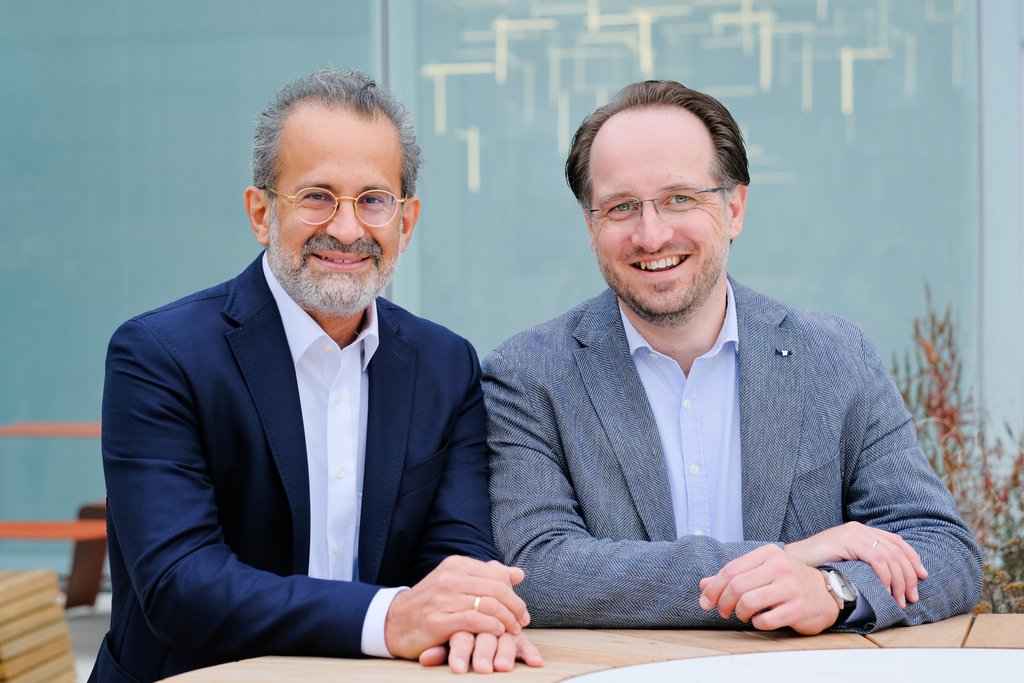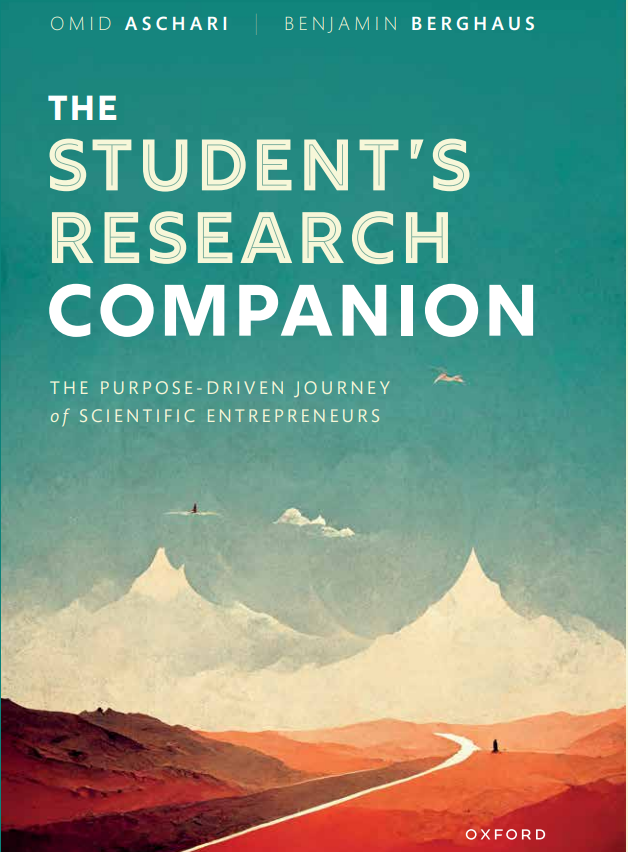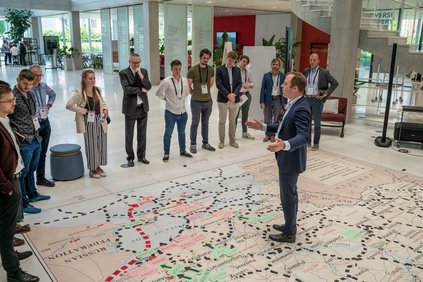Campus - 04.09.2023 - 09:30
Student theses: HSG authors want to tap into unused potential
Research potential and mental health in focus: Two HSG members have written a book to guide students through their final thesis, which is all too often still seen as a tedious task. The "Student’s Research Companion" covers five chapters offering 50 "mindsets" that can help students work more productively and overcome personal challenges to make real progress – well beyond pure examination performance.

Gemeinsam mit dem HSG-Alumnus Benjamin Berghaus hat Aschari darum das Buch «The Student’s Research Companion» geschrieben.
At HSG, students spend hours working on their theses each year, the equivalent of around 1,000 full-time positions. "So the potential is huge. Today, these written works are unfortunately often seen as a tedious task that everyone has to get over and done with", says Omid Aschari, HSG Associate Professor and head of the internationally renowned master's programme in Strategy & International Management (SIM).
This is precisely why Aschari teamed up with HSG alumnus Benjamin Berghaus to write the book "The Student's Research Companion", which was published in spring 2023 by Oxford University Press, the world's largest university publisher. It covers five chapters with a total of 50 "mindsets" which, according to the blurb, should help students "keep their nerve, their minds alert and their productivity high".
Promoting mental health
Each mindset is outlined over a handful of pages. "It's a reference book that you can also read in extracts if you are interested in a particular topic," says Aschari, who is quick to point out that it's certainly "not another methods book, because there are already enough of those in universities". Rather, the authors offer a companion that addresses frequently occurring and thoroughly personal challenges to young people in the situational role of researcher during thesis work, suggests approaches for solving problems, and encourages them to seek their own solutions. "Our book aims to help students deal more actively with personal challenges relating to the role of researcher. And our goal is for students to experience more productive work and to avoid low points here and there in relation to mental health issues," says Berghaus.
Aschari and Berghaus are both thesis supervisors with many years of experience. "The published results of scientific research suggest an almost algorithmic, error-free implementation of methods," says Berghaus. "The difficult road to get to that point, which is often anything but smooth, usually remains hidden. Solutions to tricky situations are not usually part of a student's education, so it's no wonder that they frequently encounter difficulties with their first piece of work that are often not of an academic nature at all. We want to help change this situation."
Theses have the potential to benefit society
The authors are not only concerned with the student experience, however. Impact, specifically, is a focal point: "A productive system of 1000 well-educated individuals should not, in our opinion, serve solely for examination results," says Aschari. Those who focus on a purpose – an overriding objective – instead of merely on output, can gain valuable experience from their degree course, he says, which they can then take with them to the world of work and society. "Anyone who knows what a good final thesis is realises how much problem-solving potential can be found in these ability-proving pieces of work. If we shape the thesis system more consistently to ensure an increasing proportion of the hundreds of projects has an impact beyond the library walls, we can tap into huge potential for society," says Aschari.
For this reason, both authors advocate supporting social-entrepreneurial, target-group and problem-oriented research in final theses, and explain in their book what they mean by "scientific entrepreneurship". "The best purpose for student research should not be the grade achieved for study, but the progress that comes from it," says Aschari.
Mindsets address energy balance, choice of topics and ownership
The 50 mindsets address matters such as how to find a topic for a thesis: Here, they call for a more sophisticated approach than simply following personal preferences. Instead, the focus should be on the target group to be addressed, and what kind of knowledge contribution to which problem is to be aimed for – in the spirit of "from insight to impact".
The mindsets also address the use of one's own resources, such as mental and physical energy and time, or, for example, they warn against comparing one's own project progress with that of other researchers. They also emphasise the importance of consciously assuming the role of responsible owner and designer of one's own project. Each mindset is also challenged with a short critical interjection called "The Devil's Advocate", which is then highlighted with many other facets.
"Excellent work disappears without being read"
The online platform studentsresearchcompanion.org complements the book. Here, each mindset is available in excerpts, which are supplemented in each case with literature references and further notes as well as a critical perspective. "Over time, we aim to collect feedback from our readers and thus to add to the platform continuously," says Aschari.
Furthermore, Berghaus is currently developing a digital platform for managing, mentoring, conducting and leading student research called "Research Stride". The resulting platform has been developed over the past few years through several student projects in teaching, in cooperation with the Institute of Information Management (IWI-HSG), as well as surveys completed with SIM-HSG and the mentoring programme. It aims to assist higher education institutions in unlocking a greater part of the potential inherent in student theses and developing this into a productive system that goes beyond the examination regulations. "There's too much outstanding work being done out there, most of which disappears unread in the library," says Berghaus.
In order to gather as many different perspectives as possible, Aschari and Berghaus invited ten international researchers to provide contributions to the first edition of their book. These included experienced researchers as well as some who are still in the process of writing their doctoral theses.
"The handbook is primarily aimed at young researchers – but also experienced colleagues who are willing to question themselves and their approaches once again," says Aschari. Thesis supervisors would also benefit from reading this book. "Because universities don't specifically prepare you for the demanding task of guiding young people through their final thesis."
The book is available from Oxford University Press. The printed book can be borrowed free of charge from the library or accessed as an e-book.
More articles from the same category
This could also be of interest to you
Discover our special topics
















